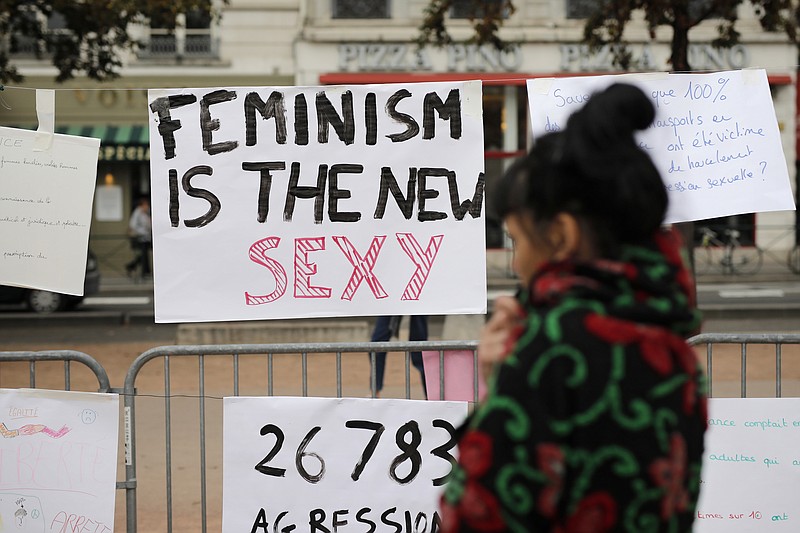Sexual intimidation victims everywhere have a message to the Harvey Weinsteins, Kevin Spaceys, Louis C.K.'s, Roy Moores, Roger Aileses, Bill O'Reillys, Mark Halprins, Bill Cosbys, Bill Clintons and Donald Trumps of the world who have not yet been outed:
Have a great weekend sweating beside your phones. Have a great week, or month - fill in the blank - sweating and wondering when someone you abused with your power-tripping and bullying will come forward and name you.
As much as all of these stories of sexual harassment, assaults and humiliating treatment make most Americans want to take a shower, the sudden power of the "#metoo" movement is in itself cleansing.
National politics correspondent Nina Burleigh puts it quite succinctly in a column for Newsweek:
"After centuries of indifference to or even tacit (and sometimes open) sanctioning of sexual harassment, abuse or assault, we are suddenly in the midst of a [male sex organ] conflagration. Powerful men in Hollywood, politics, journalism and many other fields are being pilloried, sacked or jailed for piggish or even criminal behavior toward women."
In the presence of men like these, she writes, women come and go, "working, serving and servicing -trying to earn a living wage, searching for a husband or a job, looking for venture capital or just a good time, seeking an advanced degree or a part in a movie. Often, we have no choice. We enter a room and instantly know: Oh, it's that place. There's always something unnerving in the air, like the men there have just laughed at a joke we aren't supposed to hear. And, eyes averted, we carry on."
Well, not so much anymore.
Perhaps the swell of the now full-throated #metoo movement may be the only good thing Donald Trump has brought us.
It began the day after his inauguration when millions of women took to the streets all over America to protest the fact that we live in a day and time when a childish man can be heard on tape bragging about groping women, be heard on a national radio show laughing about walking unannounced into beauty pageant dressing rooms, be watched on live TV as he threatens to sue (but never sued) 17 women who've come forward to accuse him of sexual misconduct - yet he was still elected president.
So far, Trump is the only one of these recently shamed men who has not been forced - or even asked - to step down from his power perch.
But it's clear that he's sweating. He's just got even bigger secrets and inadequacies to sweat over.
Meanwhile, what about those complicit in this kind of bullying and sexual abuse? Complicit because they knew about it and said nothing.
In Hollywood, Kevin Spacey's behavior, like that of Harvey Weinstein's, was widely known. At Fox, the network had been making settlements with women over Ailes' and O'Reilly's actions for years. Clinton had a long reputation for womanizing, and Trump openly bragged then dismissed it as locker-room talk and fake news.
Meanwhile those around these people just let it go on and on and on - sometimes even helping with the logistics.
Thus the bad behaviors became bad open secrets.
That is how Roy Moore's proclivity for teenage dates when he was a 30-something assistant district attorney came to light.
Washington Post staffers reporting in Alabama about supporters of Moore's U.S. Senate campaign heard about his past indulgences seeking relationships with teenage girls. Over the ensuing three weeks, two Post reporters interviewed 30 people and tracked down, contacted and interviewed four women who said they were pursued by Moore when they were teens. One, Leigh Corfman, was 14 at the time. The age of consent in Alabama was then and still is 16.
Neither Corfman nor the three other women sought out The Post. All were initially reluctant to speak publicly but chose to do so after multiple interviews, saying they thought it was important for people to know about their interactions with Moore. The women say they don't know one another.
Corfman said Moore took off her clothes and his, then touched her over her underwear and guided her hand to touch him over his underwear. It scared her, and she asked him to take her home. He did, she said.
She told two childhood friends, who convinced her not to see him again. She did not tell her mother until about a decade later. All three told the Post what Corfman told them at the time. The stories were consistent.
Here's the point: Moore's behavior apparently was so common that people in the Gadsden, Ala., community still think it odd decades later. And if two Washington Post reporters can find four women with first-hand knowledge like this, then there must be 40 more out there.
Lots of people knew, yet Moore has been a prosecutor, a judge, a two-time Alabama Supreme Court chief justice who wrapped himself in the Bible and now a Senate candidate. He, like all the abusers recently outed, wields lots of power. Power is an effective intimidator.
Still, aren't those who know about something like this and do nothing just as much a bully, child abuser, sex abuser and pervert as the perpetrator?
